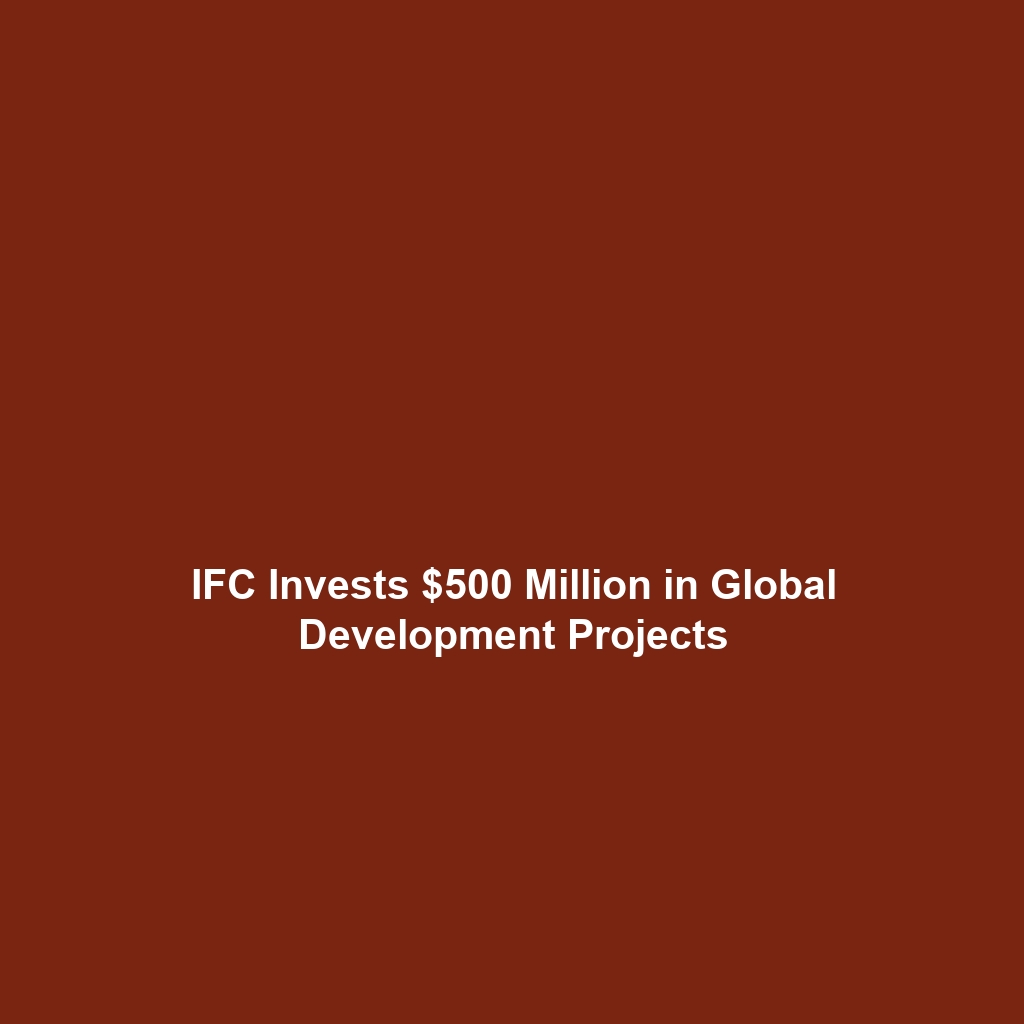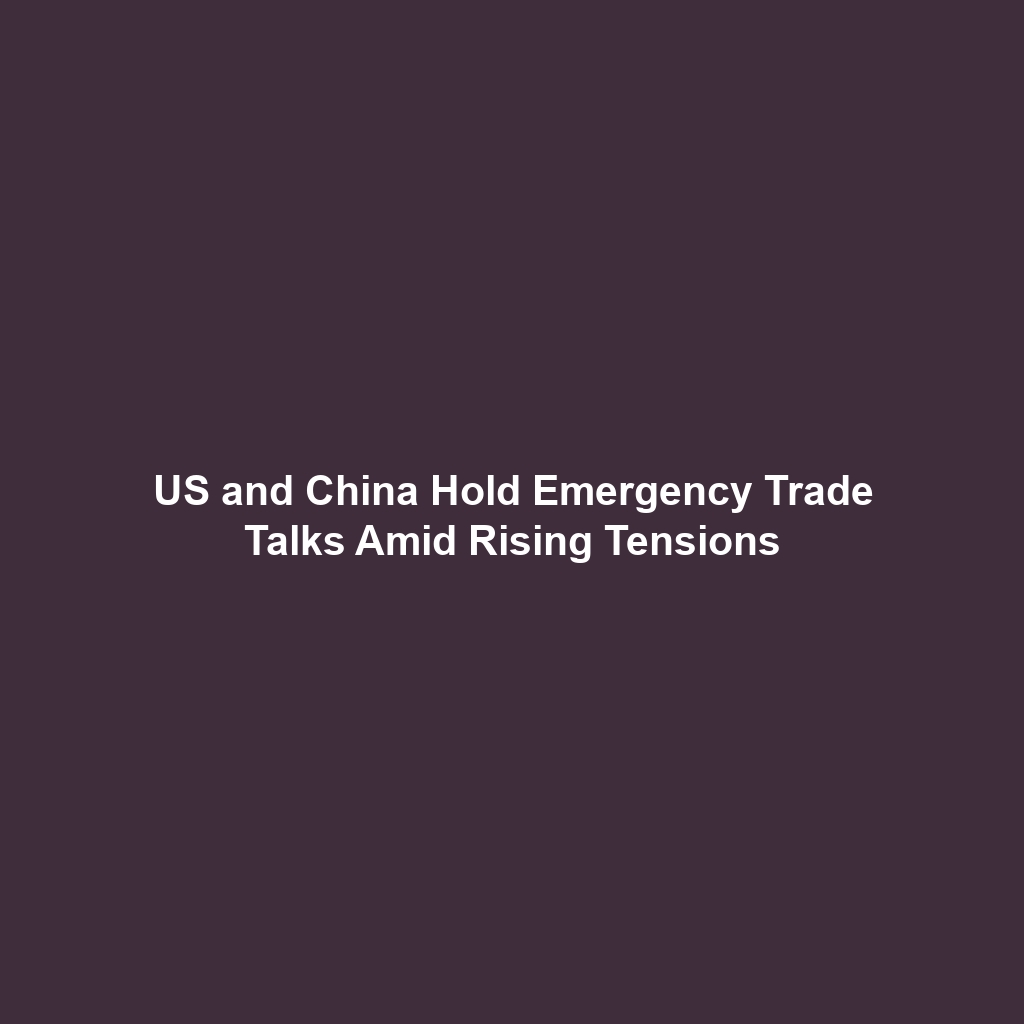Your cart is currently empty!
Tag: climate change

IFC Invests $500 Million in Global Development Projects
IFC Invests $500 Million in Global Development Projects
IFC Invests $500 Million in Global Development Projects
The International Finance Corporation (IFC), a member of the World Bank Group, has announced a substantial investment of $500 million aimed at supporting infrastructure and sustainability projects across the globe. This strategic move is designed to bolster economic growth and enhance environmental sustainability in developing nations, reflecting a renewed commitment to private-sector development in key sectors.
Overview of the Investment Initiative
The IFC’s recent funding initiative comes as part of a broader strategy to bridge the financing gap in critical infrastructure projects around the world. The organization has identified a pressing need for investment, particularly in emerging markets, where infrastructural deficiencies can hinder economic progress and resilience against climate change.
According to the IFC, these funds will be allocated to a variety of projects focusing on sectors such as renewable energy, urban development, and transportation. This diversified approach is aimed at not only stimulating economic growth but also fostering sustainable practices that align with the United Nations Sustainable Development Goals (SDGs).
Addressing Global Challenges
The global landscape is facing numerous challenges, including poverty, climate change, and rapid urbanization. The World Bank Group estimates that developing countries need approximately $3.7 trillion annually to meet their development needs, which underscores the significance of the IFC’s investment.
“We believe that private sector investment is crucial for driving development and improving livelihoods in developing nations,” said Makhtar Diop, Managing Director of the IFC. “This $500 million funding is designed to catalyze additional investment and create opportunities for sustainable growth.”
The Importance of Sustainable Development
Sustainable development is at the core of the IFC’s mission. The organization’s investments are guided by principles that prioritize environmental protection, social equity, and economic viability. By channeling funds toward projects like renewable energy and efficient transportation systems, the IFC aims to foster a green economy that benefits communities while combating climate change.
The recent investment is anticipated to contribute significantly to several green infrastructure endeavors, which are essential in reducing reliance on fossil fuels and minimizing environmental degradation. Projects that harness solar, wind, and hydroelectric power are among those that may benefit from this infusion of capital.
Targeted Areas for Investment
The IFC has outlined specific regions and sectors that will be targeted for investment with the new funding. These include:
- Renewable Energy: Increasing funding for solar, wind, and hydro projects to ensure a transition to clean energy sources.
- Urban Development: Enhancing urban infrastructure through sustainable building practices and improving public transportation.
- Agriculture: Supporting agricultural initiatives that focus on sustainable farming techniques and improving food security.
By prioritizing these areas, the IFC aims to not only create jobs but also improve living standards in communities across various regions, especially in sub-Saharan Africa and South Asia, which are among the most affected by infrastructural deficits.
Expected Outcomes of the Initiative
The IFC anticipates that this investment will lead to significant socio-economic benefits, including job creation, economic diversification, and improved access to essential services. Additionally, the funding is expected to leverage additional private-sector investments, magnifying the overall impact and effectiveness of the deployed capital.
Experts believe that the IFC’s investment is timely and crucial. “This kind of funding is important for creating an enabling environment for private investment in infrastructure, which is fundamental for economic development,” noted Dr. Rebecca M. McDonald, an economist specializing in development finance.
Conclusion
The International Finance Corporation’s $500 million investment marks a significant step toward addressing pressing global needs in infrastructure and sustainability. By focusing on clean energy, urban development, and agriculture, the IFC is setting a precedent for sustainable growth in developing countries.
As the world grapples with the dual challenges of economic recovery and climate action, the role of organizations like the IFC in mobilizing resources for development projects becomes increasingly vital. This initiative not only reflects a commitment to sustainable principles but also highlights the critical need for innovative funding solutions in addressing global challenges.

Chris Wright Highlights Liberty Energy’s Role in Sustainable Solutions
Chris Wright Highlights Liberty Energy’s Role in Sustainable Solutions
Chris Wright Highlights Liberty Energy’s Role in Sustainable Solutions
In an era of increasing environmental concerns, the energy sector is under pressure to adopt sustainable practices. Chris Wright, CEO of Liberty Energy, is a key player in this transition, championing innovative solutions aimed at reducing carbon footprints across the industry. Liberty Energy, a prominent name in the energy sector, has set a course to not only enhance its operational efficiency but also contribute positively to the global effort against climate change.
Liberty Energy’s Vision for Sustainability
Wright underscores that the company’s mission revolves around three core pillars: sustainability, efficiency, and innovation. “Our goal at Liberty Energy is not just to be a leader in energy production, but to lead a transition toward a more sustainable energy landscape,” he stated in a recent interview. The company is actively investing in technologies that reduce emissions and lower the environmental impact of their operations.
One particular focus for Liberty Energy has been the integration of renewable energy sources into its portfolio. By investing in wind and solar power, Wright believes that the company can diversify its energy offerings while contributing significantly to the reduction of greenhouse gases. According to the International Renewable Energy Agency (IRENA), transitioning to renewable energy could reduce carbon emissions by more than 70% by 2050.
Innovative Solutions Being Implemented
Liberty Energy’s commitment to sustainability is exemplified through various initiatives aimed at innovating traditional energy processes. A notable project is the development of carbon capture and storage (CCS) technology. Wright emphasizes that “CCS not only mitigates emissions but also demonstrates our responsibility to address climate change proactively.” This technology enables the safe capture and storage of carbon dioxide, preventing it from escaping into the atmosphere.
Moreover, the company is also exploring hydrogen as a clean energy carrier. Wright points out, “Hydrogen has the potential to be a game-changer in the energy landscape, especially for heavy industries.” Liberty Energy is currently collaborating with several partners to develop technology that can produce hydrogen from renewable sources, which would serve as an alternative fuel for transportation and manufacturing industries.
Challenges in the Energy Sector
Despite the advances Liberty Energy is making, Wright acknowledges the inherent challenges in driving sustainability within the energy sector. Regulatory hurdles, market volatility, and the need for substantial upfront investments can impede progress. “Transitioning to sustainable practices is essential, but it requires a concerted effort from both the private sector and government bodies,” he stated.
Industry experts agree that enhanced collaboration across various sectors is vital. According to Dr. Alice Johnson, an energy policy researcher at the University of California, Berkeley, “Partnerships between energy companies, technology providers, and regulatory authorities can accelerate the transition to sustainable energy solutions.”
The Role of Policy in Promoting Sustainable Practices
Wright advocates for policies that provide incentives for companies transitioning to sustainable practices. He believes that government support can significantly reduce the financial burden associated with adopting new technologies. “When policies encourage investment in green technologies, businesses will prioritize transitioning away from fossil fuels,” he noted.
Wright’s perspective aligns with findings by the World Resources Institute, which highlights that comprehensive policies can boost job creation in the renewable energy sector. Such policies not only have the potential to mitigate climate change but also offer economic opportunities as the world moves toward a more sustainable energy model.
Future Directions for Liberty Energy
Looking ahead, Wright asserts that Liberty Energy plans to expand its sustainable initiatives in alignment with global climate goals. The company is actively assessing new technologies and strategies that can enhance sustainability and operational efficiency. “We are committed to continuous improvement in our energy solutions to ensure a better future for our planet,” he declared.
As part of its strategy, Liberty Energy is also enhancing its stakeholder engagement efforts, ensuring that community perspectives are included in sustainability initiatives. Wright emphasizes the importance of transparency and advocacy in gaining public trust as the company evolves its business model to one that is more environmentally conscious.
Conclusion
Chris Wright’s leadership at Liberty Energy illustrates a concerted effort to impact sustainability within the energy sector positively. Through innovative projects in carbon capture, investments in renewable energy, and strong advocacy for supportive policies, Liberty Energy is positioning itself as a leader in the transition to sustainable energy solutions.
As the energy landscape continues to evolve, the actions taken by companies like Liberty Energy will be crucial in determining the pace and success of this transition. With ongoing challenges, a commitment to sustainability remains imperative for the future of energy production and the health of our environment.

US and China Hold Emergency Trade Talks Amid Rising Tensions
US and China Hold Emergency Trade Talks Amid Rising Tensions
US and China Hold Emergency Trade Talks Amid Rising Tensions
In a significant move to de-escalate increasing economic tensions, trade officials from the United States and China convened for emergency discussions on Tuesday in Washington, D.C. The meeting comes amid a backdrop of escalating disputes that have resulted in tariffs, accusations of unfair trade practices, and rising nationalistic sentiments.
Context of the Trade Tensions
Since the onset of the trade war in 2018, U.S.-China relations have gone through multiple oscillations marked by tariffs on billions of dollars’ worth of goods. The Biden administration initially aimed to build consensus with allies to counteract China’s economic influence but has faced numerous challenges domestically and internationally.
In recent months, tensions have heightened over a myriad of issues, including technology transfer, intellectual property rights, and China’s growing assertiveness in the Asia-Pacific region. Trade experts and analysts have voiced concerns that if these tensions are not addressed, they could lead to broader geopolitical conflicts.
The Main Issues on the Table
The emergency talks focused on several key issues that have strained the trade relationship between the two nations:
- Tariffs: Both sides are grappling with the consequences of existing tariffs that have led to increased consumer prices and affected multiple industries.
- Supply Chains: The pandemic has disrupted global supply chains, prompting discussions on how both countries can work together to maintain stability in international logistics.
- Technology and Security: U.S. concerns over China’s technology practices, especially in areas such as telecommunications, remain a focal point of negotiation.
- Climate Change: Climate policy and commitments are expected to figure prominently in discussions as both superpowers recognize the need for cooperation on global issues despite their rifts.
Expert Opinions on Trade Resolution
Experts have provided mixed forecasts regarding the potential outcomes of the emergency talks. According to CNBC, Richard Haass, President of the Council on Foreign Relations, stated, “These discussions represent a crucial opportunity for both sides to potentially reset the relationship and focus on areas of mutual interest.”
Conversely, some analysts caution that merely convening does not guarantee a resolution. “Given the entrenched positions of both nations, significant breakthroughs may be difficult to achieve,” noted Margaret Tan, a trade economist at the Brookings Institution, in a recent interview.
Potential Outcomes of the Talks
The anticipated outcomes of the emergency talks could have profound implications not only for the U.S. and China but for the global economy at large. Analysts see several possible scenarios:
- Incremental Agreements: One scenario is the possibility of reaching incremental agreements that address specific areas of concern without fully resolving the underlying tensions.
- Delay in Tariffs: Another possible outcome could be a temporary pause or rollback of certain tariffs, aiming to ease pressure on specific industries.
- Long-Term Framework: There is also the prospect of establishing a long-term framework for negotiations that could lead to a more sustainable trade relationship.
Impacts on Global Economy
The outcome of the emergency trade talks could have extensive ramifications beyond the bilateral relationship. A failure to reach consensus could hinder global trade recovery and potentially lead to increased economic volatility.
As noted by economist David Autor of MIT, “The interconnectedness of global economies means that tensions between two economic powers will inevitably ripple out, affecting supply chains and market stability worldwide.”
Looking Ahead
As the talks unfold, many observers are looking for signs of constructive dialogue and potential resolution strategies. While optimism exists among some analysts, the historical context of U.S.-China relations raises questions regarding the sustainability of any agreements reached.
In conclusion, the emergency trade talks between the U.S. and China are not just significant for the two nations involved but hold far-reaching implications for the global economic landscape. As both sides attempt to navigate the complexities of their relationship, the outcomes could either set the stage for cooperation or further intensify existing tensions.






